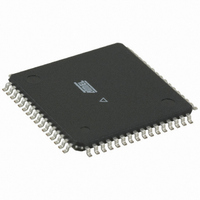ATMEGA649A-AU Atmel, ATMEGA649A-AU Datasheet - Page 249

ATMEGA649A-AU
Manufacturer Part Number
ATMEGA649A-AU
Description
IC MCU AVR 64K FLASH 64TQFP
Manufacturer
Atmel
Series
AVR® ATmegar
Specifications of ATMEGA649A-AU
Core Processor
AVR
Core Size
8-Bit
Speed
16MHz
Connectivity
SPI, UART/USART, USI
Peripherals
Brown-out Detect/Reset, LCD, POR, PWM, WDT
Number Of I /o
54
Program Memory Size
64KB (32K x 16)
Program Memory Type
FLASH
Eeprom Size
2K x 8
Ram Size
4K x 8
Voltage - Supply (vcc/vdd)
1.8 V ~ 5.5 V
Data Converters
A/D 8x10b
Oscillator Type
Internal
Operating Temperature
-40°C ~ 85°C
Package / Case
64-TQFP
Processor Series
ATmega
Core
AVR
Data Bus Width
8 bit
Data Ram Size
4 KB
Interface Type
SPI, USART
Maximum Clock Frequency
16 MHz
Number Of Programmable I/os
54
Number Of Timers
3
Operating Supply Voltage
3.3 V
Maximum Operating Temperature
+ 85 C
Mounting Style
SMD/SMT
Minimum Operating Temperature
- 40 C
Operating Temperature Range
- 40 C to + 85 C
Lead Free Status / RoHS Status
Lead free / RoHS Compliant
Available stocks
Company
Part Number
Manufacturer
Quantity
Price
- Current page: 249 of 712
- Download datasheet (41Mb)
23.5.2
8284A–AVR–10/10
LCDCRB – LCD Control and Status Register B
• Bit 0 – LCDBL: LCD Blanking
When this bit is written to one, the display will be blanked after completion of a frame. All seg-
ment and common pins will be driven to ground.
Note:
• Bit 7 – LCDCS: LCD Clock Select
When this bit is written to zero, the system clock is used. When this bit is written to one, the
external asynchronous clock source is used. The asynchronous clock source is either
Timer/Counter Oscillator or external clock, depending on EXCLK in ASSR. See
Operation of Timer/Counter2” on page 158
• Bit 6 – LCD2B: LCD 1/2 Bias Select
When this bit is written to zero, 1/3 bias is used. When this bit is written to one, ½ bias is used.
Refer to the LCD Manufacture for recommended bias selection.
• Bit 5:4 – LCDMUX[1:0]: LCD Mux Select
The LCDMUX[1:0] bits determine the duty cycle. Common pins that are not used are ordinary
port pins. The different duty selections are shown in
Table 23-2.
Note:
• Bits 3:0 – LCDPM[3:0]: LCD Port Mask
The LCDPM3:0 bits determine the number of port pins to be used as segment drivers. The dif-
ferent selections are shown in
port pins.
Table 23-3.
Bit
(0xE5)
Read/Write
Initial Value
LCDPM3
LCDMUX1
ATmega169A/169PA/329A/329PA/649A/649P/3290A/3290PA/6490A/6490P
0
0
0
0
0
1
1
Bit 3, LCDPM3 is only available in ATmega3290A/3290PA/6490A/6490P.
1. 1/2 bias when LCD2B is written to one and 1/3 otherwise.
LCDCS
R/W
LCDPM2
LCD Duty Select
LCD Port Mask (Values in bold are only available in
ATmega3290A/3290PA/6490A/6490P)
7
0
LCDMUX0
0
0
0
0
1
0
1
LCD2B
R/W
6
0
LCDPM1
0
0
1
LCDMUX1
Table 23-3 on page
R/W
5
0
Static
Duty
1/2
1/3
1/4
LCDPM0
LCDMUX0
0
1
0
R/W
for further details.
4
0
1/2 or 1/3
1/2 or 1/3
1/2 or 1/3
Static
Bias
LCDPM3
249. Unused pins can be used as ordinary
R/W
Table 23-2 on page
I/O Port in Use as
Segment Driver
3
0
(1)
(1)
(1)
SEG0:12
SEG0:14
SEG0:16
LCDPM2
COM Pin
R/W
COM0:1
COM0:2
COM0:3
COM0
2
0
LCDPM1
R/W
1
0
249.
Maximum Number
of Segments
LCDPM0
I/O Port Pin
R/W
”Asynchronous
COM1:3
COM2:3
0
0
COM3
None
13
15
17
LCDCRB
249
Related parts for ATMEGA649A-AU
Image
Part Number
Description
Manufacturer
Datasheet
Request
R

Part Number:
Description:
Manufacturer:
Atmel Corporation
Datasheet:

Part Number:
Description:
Manufacturer:
ATMEL Corporation
Datasheet:

Part Number:
Description:
Manufacturer:
ATMEL Corporation
Datasheet:

Part Number:
Description:
IC AVR MCU 64K 16MHZ 5V 64TQFP
Manufacturer:
Atmel
Datasheet:

Part Number:
Description:
IC AVR MCU 64K 16MHZ 5V 64-QFN
Manufacturer:
Atmel
Datasheet:

Part Number:
Description:
IC AVR MCU 64K 16MHZ COM 64-TQFP
Manufacturer:
Atmel
Datasheet:

Part Number:
Description:
IC AVR MCU 64K 16MHZ IND 64-TQFP
Manufacturer:
Atmel
Datasheet:

Part Number:
Description:
IC AVR MCU 64K 16MHZ COM 64-QFN
Manufacturer:
Atmel
Datasheet:

Part Number:
Description:
MCU AVR 64KB FLASH 16MHZ 64TQFP
Manufacturer:
Atmel
Datasheet:

Part Number:
Description:
MCU AVR 64KB FLASH 16MHZ 64QFN
Manufacturer:
Atmel
Datasheet:

Part Number:
Description:
IC AVR MCU 64K 16MHZ IND 64-QFN
Manufacturer:
Atmel
Datasheet:

Part Number:
Description:
IC MCU AVR 64K 5V 16MHZ 64-TQFP
Manufacturer:
Atmel
Datasheet:

Part Number:
Description:
IC MCU AVR 64K 5V 16MHZ 64-QFN
Manufacturer:
Atmel
Datasheet:

Part Number:
Description:
MCU 8-Bit ATmega AVR RISC 64KB Flash 5V 64-Pin TQFP T/R
Manufacturer:
Atmel
Datasheet:











